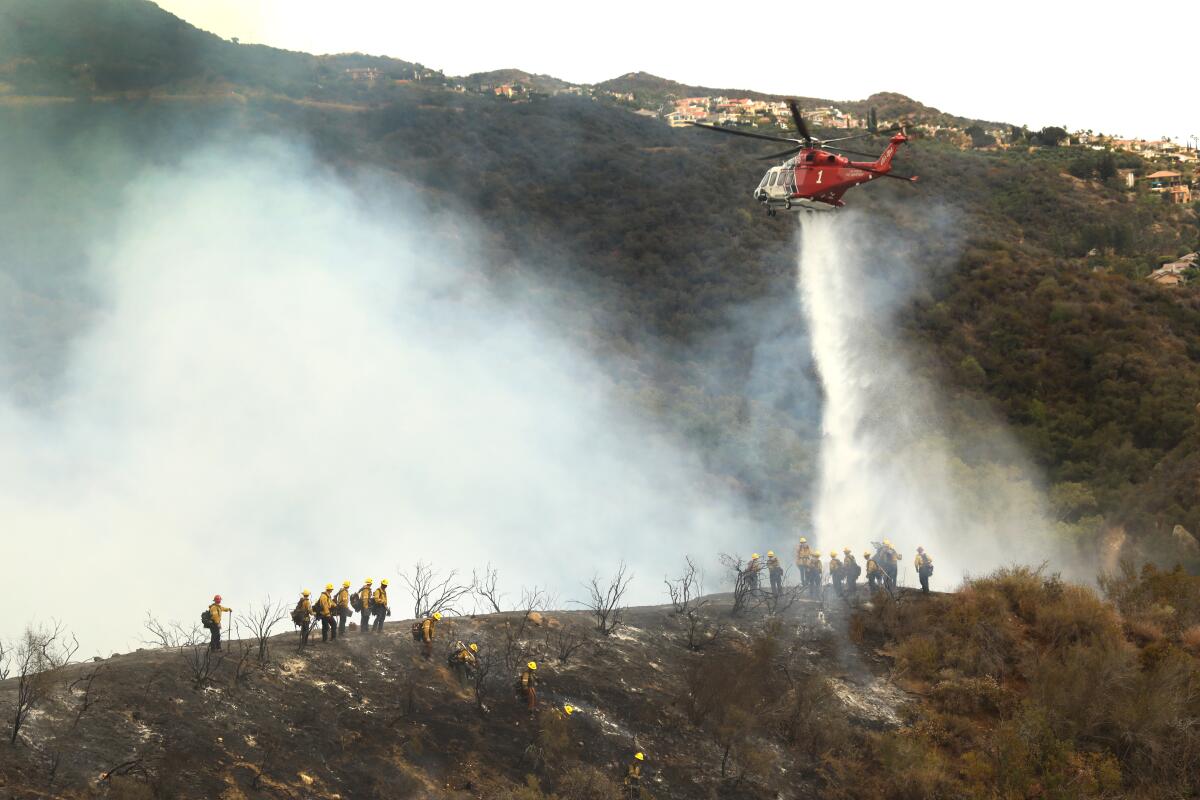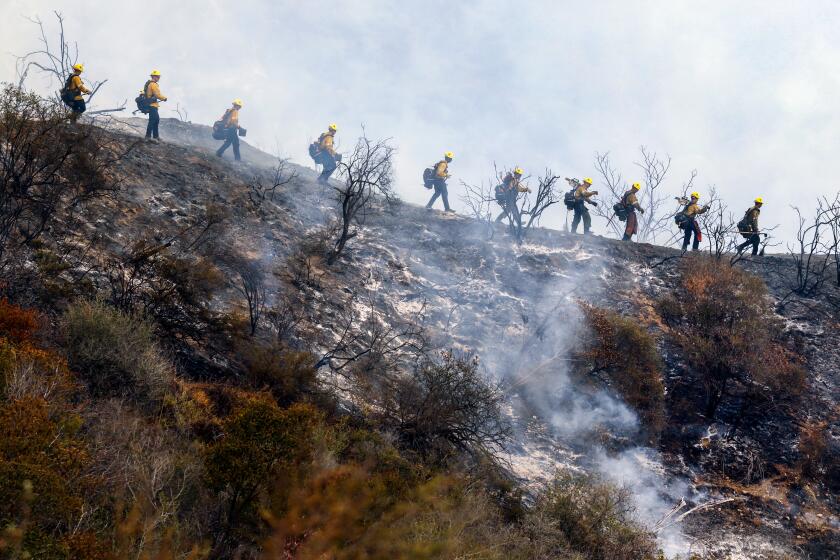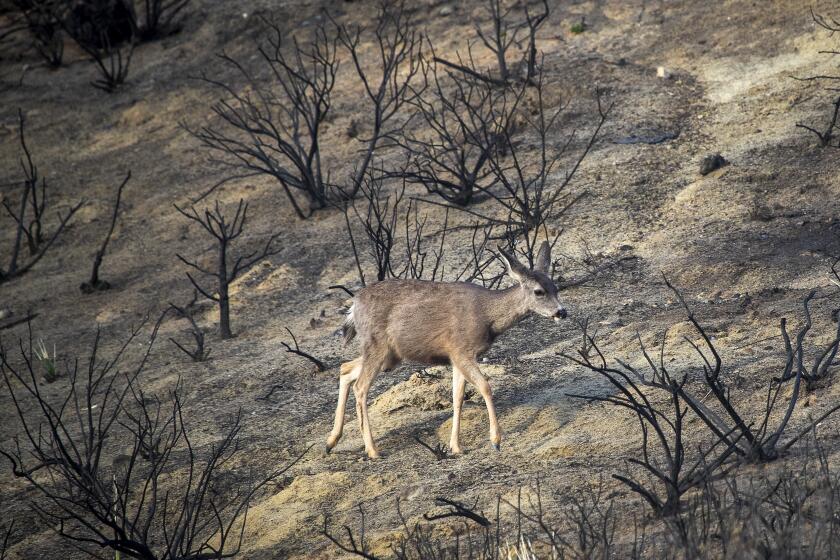Raging Palisades fire is a dangerous warning of California’s new year-round fire reality

Scott Ferguson could see the wildfire burning directly across the canyon as he looked out the window of his Topanga Canyon home Sunday afternoon.
The 30-year resident was monitoring two radios and a stream of Twitter feeds, 18 browser tabs open as he toggled back and forth between weather reports and emergency alerts.
The fire was just over the eastern ridge, and he didn’t think it would reach his home in Fernwood, on the canyon’s western side. But his car was packed just in case.
“This is not normal, to have a big fire like this in May,” said Ferguson, who also serves as board chair of the Topanga Coalition for Emergency Preparedness. “This is the type of thing we’d usually be doing in November.”
The Palisades fire, which had swelled to more than 1,300 acres by Sunday afternoon and forced the evacuation of about 1,000 people, came as a reminder of an unsettling truth: The fire season is starting earlier each year, and it is now underway.
The 1,325-acre fire is threatening homes in Topanga Canyon, but fire officials were hoping cooler, moist conditions could help in their efforts to contain the blaze.
Or, depending on how you look at it, it never ended at all.
“We no longer have a brush fire season,” said Margaret Stewart, spokeswoman for the Los Angeles Fire Department. “The extended duration of the drought and the dryness of the vegetation across the region means that we have these brush fires throughout the year.”
Experts have been warning that the combination of warmer temperatures, longer and drier droughts and more intense bursts of precipitation between them has primed the Western United States for a long and active year of fire.
Still, some residents who awoke to orange skies and falling ash found it surreal that the scenes, which have become fairly commonplace in August and September, were playing out in the spring.
“If you look out any window or if you step outside, all you see is just billowing smoke everywhere,” said Jessica Rogers, president of the Pacific Palisades Residents Assn.
Climate, weather, human behavior and even luck will dictate whether the 2021 wildfire season goes down in the record books like 2020.
As she spoke with a reporter, she received a notice that a section of the Palisades Highlands neighborhood was being placed under an evacuation warning due to shifting winds.
“My daughter said, ‘Mommy I’m very scared,’” Rogers said, adding that the noise of the helicopters was unnerving.
A couple of hours later, her children and their father evacuated, opting to stay with family in Santa Monica, she said.
With the conditions in place for blazes to spread quickly and become dangerous, all that’s needed is a spark.
That happened around 10 p.m. Friday, when an arsonist is suspected of having ignited the fire along a trail leading up into the Santa Monica Mountains, authorities said.
Experts have warned that warmer temperatures, longer and drier droughts and more intense bursts of precipitation have primed the West for a long, active year of fire.
Los Angeles fire officials said Sunday evening that they had “aggressively tracked down any and all potential leads” and were questioning a possible arson suspect. Another who had been detained earlier had been released, they said.
The blaze began deep in a remote canyon blanketed with old-growth chaparral that hadn’t burned in more than 50 years, Stewart said.
“The terrain we’re facing means we can’t just get in and get our hands around the entire perimeter with hand lines quickly,” she said. “So that’s the predominant challenge.”
Under the cover of darkness the night the fire began, firefighters struggled to climb the steep hillsides. They could not lay in water supply lines due to a lack of visibility that would allow them to know where the flames were moving, authorities said. There was also a dearth of safe escape routes that would enable them to retreat if needed.
Still, helicopters made water drops into the night, and crews held the blaze to 15 acres through Saturday morning.
About 4 p.m. Saturday, fire officials reported a 100-acre flare-up along the fire front, prompting evacuation orders for homes in a portion of Topanga Canyon.
It’s not clear whether someone was actively setting additional fires in the area at that time.
In a video Rogers posted to the Pacific Palisades Residents Assn.’s social media pages Saturday, Los Angeles Police Sgt. Jay Balgemino told her that authorities were pursuing a man who may have been responsible for igniting the blaze and was continuing to set fires.
“We believe there’s a male up in the hills right now setting off fires that caused these fires to start from last night,” Balgemino said.
“Our people up in the air are observing fires coming up from the location where we last saw him,” he added. “So yes, there’s fires being set as of this moment.”
Meanwhile, the fire was 0% contained Sunday evening. Officials announced that Topanga Elementary Charter School would be closed Monday due to air quality concerns. Topanga Canyon Boulevard between Pacific Coast Highway and Mulholland Drive will be closed to traffic.
Though weather conditions were favorable, with high humidity, calm winds and dense cloud cover, terrain remained a key challenge, as the canyon was difficult to access by vehicle and firefighters were having to hike in on foot, Stewart said.
“It’s very tedious and slow going,” she said. “There’s heavy brush and it’s difficult terrain, which is why it’s primarily an air battle.”
Crews were using fixed-wing aircraft and helicopters, she said.
Spectators posed another impediment, with fire officials at one point requesting help from law enforcement to control what they described as a growing crowd of hikers and other onlookers in the firefighting area.
“We’re all a bit busy right now with the Fire & don’t have resources to keep telling hikers to stay away,” the California Highway Patrol wrote on Twitter.
Throughout the afternoon, Ferguson continued to scan for updates to post to the website and social media accounts of the Topanga Coalition for Emergency Preparedness, a volunteer group founded by residents after they had trouble getting accurate information during a bad fire in 1993.
The group is unique because it verifies information with authorities before disseminating it and takes care not to stoke speculation or panic, he said.
“We’ve gone through a lot of fires — done this over and over again — and we kind of have it down,” he said. “We’re sort of like professional volunteers.”
Although he and the other staffers have day jobs, they find they must put their “real lives” aside once a fire becomes active, he said.
“We all live in the canyon, so a thing like this directly affects us personally,” he said. “So we’ve made it our mission to really get knowledgeable about this stuff.”
Times staff writer Soumya Karlamangla contributed to this report.
More to Read
Sign up for Essential California
The most important California stories and recommendations in your inbox every morning.
You may occasionally receive promotional content from the Los Angeles Times.













